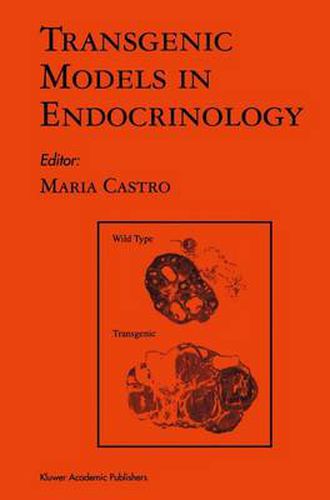Readings Newsletter
Become a Readings Member to make your shopping experience even easier.
Sign in or sign up for free!
You’re not far away from qualifying for FREE standard shipping within Australia
You’ve qualified for FREE standard shipping within Australia
The cart is loading…






This title is printed to order. This book may have been self-published. If so, we cannot guarantee the quality of the content. In the main most books will have gone through the editing process however some may not. We therefore suggest that you be aware of this before ordering this book. If in doubt check either the author or publisher’s details as we are unable to accept any returns unless they are faulty. Please contact us if you have any questions.
The dramatic recent expansion in genomic information has motivated the development of new approaches to characterize gene expression and function. A critical issue for both basic and clinical endocrinologists is the physiological role of genes involved in regulating endocrine functions. Transgenic technologies allow the translation of genotypic information into specific phenotypes by using gene overexpression or loss of specific gene functions. Murine functional genomics is thus of central importance in modem biomedical endocrine research. Although mice are at present, the preferred mammalian species for genetic manipulations because of the availability of pluripotent embryonic. stem cells and inbred strains and the relatively low breeding and maintenance costs, transgenic rats have also been generated and used to study endocrine physiology. The two basic techniques used in the creation of transgenic animal models are integration of foreign DNA into a fertilized oocyte by random chromosomal insertion and homologous recombination in embryonic stem cells that are then introduced into zygotes. Transgenic mice and rats serve as sophisticted tools to probe protein function, as models of human disease, and as hosts for the testing of gene replacement and other therapies. Embryonic stem cell libraries for mouse gene deletion are being developed, which will make it possible to generate knockout mice rapidly and without the need to analyze gene structure, construct targeting vectors, and screen embryonic stem cell clones. A novel approach to transgenesis for the expression of DNA within adult differentiated neuroendocrine cells in vivo is using viral vectors.
$9.00 standard shipping within Australia
FREE standard shipping within Australia for orders over $100.00
Express & International shipping calculated at checkout
This title is printed to order. This book may have been self-published. If so, we cannot guarantee the quality of the content. In the main most books will have gone through the editing process however some may not. We therefore suggest that you be aware of this before ordering this book. If in doubt check either the author or publisher’s details as we are unable to accept any returns unless they are faulty. Please contact us if you have any questions.
The dramatic recent expansion in genomic information has motivated the development of new approaches to characterize gene expression and function. A critical issue for both basic and clinical endocrinologists is the physiological role of genes involved in regulating endocrine functions. Transgenic technologies allow the translation of genotypic information into specific phenotypes by using gene overexpression or loss of specific gene functions. Murine functional genomics is thus of central importance in modem biomedical endocrine research. Although mice are at present, the preferred mammalian species for genetic manipulations because of the availability of pluripotent embryonic. stem cells and inbred strains and the relatively low breeding and maintenance costs, transgenic rats have also been generated and used to study endocrine physiology. The two basic techniques used in the creation of transgenic animal models are integration of foreign DNA into a fertilized oocyte by random chromosomal insertion and homologous recombination in embryonic stem cells that are then introduced into zygotes. Transgenic mice and rats serve as sophisticted tools to probe protein function, as models of human disease, and as hosts for the testing of gene replacement and other therapies. Embryonic stem cell libraries for mouse gene deletion are being developed, which will make it possible to generate knockout mice rapidly and without the need to analyze gene structure, construct targeting vectors, and screen embryonic stem cell clones. A novel approach to transgenesis for the expression of DNA within adult differentiated neuroendocrine cells in vivo is using viral vectors.